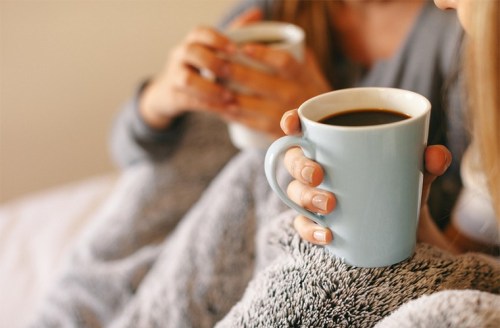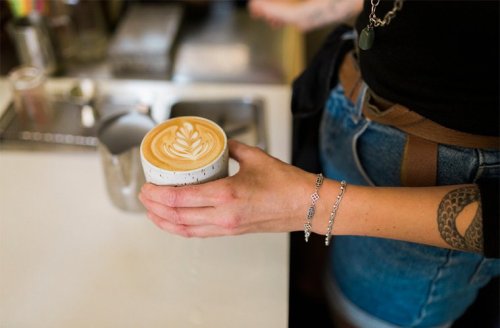Let’s settle this: Is coffee a health-boosting drink or a guilty pleasure (slash necessary evil)?
There are few things the wellness world is more divided on than morning joe. We consulted with a java-obsessed MD to get answers.
There are few topics that divide the wellness world more than coffee. (Not even the Nike versus Adidas debate comes close.)
Studies show it cuts your risk of cancer, but on the other hand it may keep you up all night—and even kill your sex drive. (Yikes!) And what’s with those people who come to a fitness class with a Starbucks cup in hand? That can’t be healthy, can it?
To set the record straight once and for all, I turned to FitnessGenes CEO and co-founder Dan Reardon, MD. The Brit is very passionate about coffee, and not just because it fuels his long days; he’s seen firsthand how the caffeinated beverage affects people on a cellular level, thanks to the DNA kit he developed—which makes diet and workout recommendations based on analysis of saliva samples.
So, is coffee good or bad for you? What time of day should you stop drinking it? And what’s the deal with drinking it before a workout?
Keep reading for answers to your most pressing java-related questions.

Is coffee healthy?
Recently, a new report came out saying drinking coffee on the reg can literally add years to your life. In one study, scientists followed over 20,000 participants for over 10 years and tracked a whole host of habits and how they affected longterm health—and coffee drinking was one of them. Researchers found that participants with the highest consumption had the lowest risk of all causes of death. So what does our expert think of all this?
According to Dr. Reardon, yes, coffee is healthy—but just for certain people. “There’s a strong link between caffeine preventing breast cancer in women who are genetically susceptible to it, so that’s a health benefit,” he says. “There’s also strong evidence of coffee being connected to better cognitive function and mental stimulation.” (You just have to look around the office to attest to that.)
Okay, so coffee definitely has some good-for-you cred. So why the caveat that it isn’t something everyone should be sipping on? “People metabolize it at different speeds,” Dr. Reardon says. “So there’s a variation when people should consume coffee.” He adds that when too much is consumed—and at the wrong time—it’s linked to causing high blood pressure.
The verdict: A piping hot cup can be healthy, if consumed in the amount and time that’s best for your body. Which brings up the second big caffeine query…

How do you know when—and how much—is best for you?
Some people can order a shot of espresso as an after-dinner nightcap and have no problem falling asleep a couple hours later, while others can’t have any caffeine after 4 p.m. or they’ll be up all night. So how do you know where you fall?
You could get your DNA tested (according to Dr. Reardon, you want to look at “a gene called CYP-182 to see how fast caffeine is broken down and its compounds are released in the body”), but a far easier option is just making an educated guess by paying attention to your body post-cup of joe. If you feel its effects almost immediately? That means you metabolize coffee quickly. Whereas if it takes a bit to kick in, you likely metabolize it on the slower side.
Figuring this out impacts more than just the timing of your Starbucks run—one study showed that people who metabolize coffee slowly are at a greater risk for having a heart attack. However, if your body can handle the caffeine, another study conducted on lab mice found that the cells inside your blood vessels benefit the most after four to five espresso shots per day. Meaning, select proteins inside of older cardiovascular cells begin to act like younger ones, improving your overall heart health.
The verdict: Fast metabolizers can tolerate more coffee than slower metabolizers—which means that they can drink it later in the day with way less problem. And if you do metabolize well, consider sipping four to five espressos per day to look out for your heart.

Should you drink coffee before a workout?
According to Dr. Reardon, an iced coffee isn’t out of place in the gym. “It’s been linked to increasing athletic performance and also contributing to weight loss,” he says. Science backs up his claim—one study found that consuming caffeine an hour prior to working out led to better endurance.
And no, it doesn’t cause dehydration. But while it has been linked to boosting staying power, the jury’s still out when it comes to strength training.
The verdict: A pre-workout coffee date can’t hurt—but don’t expect it to suddenly help you with that pull-up.

Is paying extra worth it?
Your favorite corner cafe is charging nearly $5 for a piping-hot cup, while Dunkin’ Donuts is selling it for half that. Does it really matter? Our expert firmly believes that not all coffee is created equal—and paying for better beans is worth it. “I can go to a very poor quality [cafe], drink a cup of coffee, and literally fall asleep in 10 minutes,” he says. “That could be a sign that there’s pollution in the beans, which is speeding up my liver enzymes and how quickly I am metabolizing it.”
Dr. Reardon explains that pesticides, storage facility cleanliness, and fungi infections all can lead to coffee bean pollution. (All things you definitely don’t want to be consuming anyway.)
The verdict: To ensure your body is getting the good stuff, go for organic—and if possible, check out the brand’s website to get an idea if they prioritize good farming practices.
If you decide coffee isn’t right for you, let’s just say you have a lot of other (super-healthy) options. And that’s not the only wellness myth we’re here to bust: Here’s everything you need to know about vitamin D and hydration.
Originally published March 8, 2017; updated August 1, 2018.
Sign Up for Our Daily Newsletter
Get all the latest in wellness, trends, food, fitness, beauty, and more delivered right to your inbox.
Got it, you've been added to our email list.










